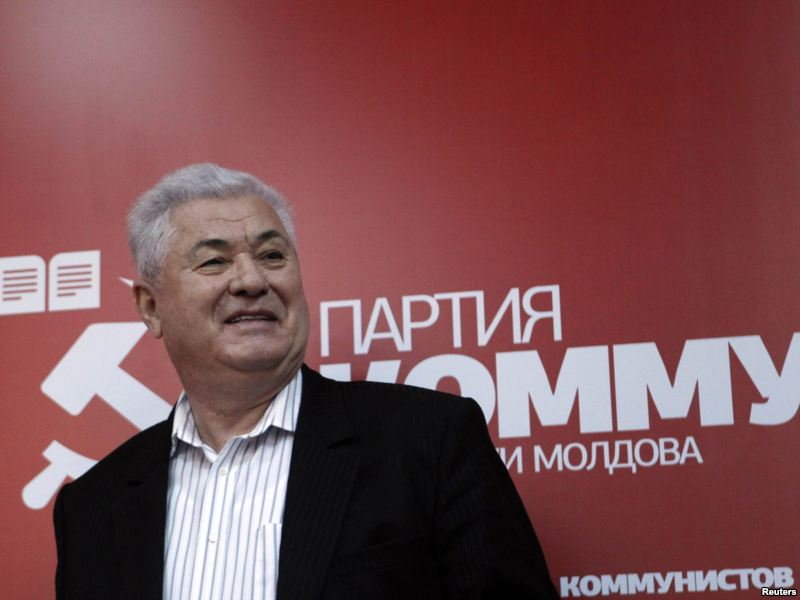
Moldova’s Communist Party Haunted by Its Past and Its Present
Publication: Eurasia Daily Monitor Volume: 9 Issue: 135
By:

Moldova’s parliament initially banned the Communist Party and confiscated all its assets in August 1991, when the pro-Soviet putsch failed in Russia while Moldova proclaimed its independence. The banned party was the local branch of the Communist Party of the Soviet Union (CPSU). The next Moldovan parliament, however, legalized a new communist Party, technically under the name Party of Communists of the Republic of Moldova, founded by members of the banned party under Vladimir Voronin, and led by him from 1994 to date (Timpul, July 13).
This party went on to win solid pluralities of the vote in all parliamentary elections held since then (1998, 2001, 2005, April and July 2009, November 2010). The party’s long-term resilience corresponds with a relatively favorable view of the Soviet period in much of Moldova’s populace. These twin factors are unique to Moldova in this combination. Although Soviet political socialization had been equally effective in Moldova, Belarus and parts of Ukraine, it is only in Moldova that free and fair elections enabled a reborn Communist Party to regain power for a considerable length of time, and outvote all other parties for an even longer period.
Condemnation of Communism, repudiation of the Soviet system, and even non-political commemoration of the victims, were never popular issues with the majority of Moldova’s voters from the early 1990s onward. Moldovan governments and parliaments never faced any serious political pressure to address those issues. The intelligentsia’s Romanian-minded section, while vocally anti-communist, lacks critical mass or close links with the Moldovan-minded populace.
In Moldova’s political arena, anti-communism became narrowly identified with Romanianism and the political right, which are themselves synonymous in Moldova. First the Popular Front/Christian Democrat Party (early 1990s to 2005) and then the Liberal Party (after 2006) were almost alone in condemning the communist ideology and commemorating the victims. Beyond any doubt, their position stemmed from core values. But at the same time, programmatic anti-communism served these small parties to hold their voters together. When the Popular Front/Christian Democrats abandoned programmatic anti-communism and Romanianism, their electorate moved almost entirely to the Liberal Party, which now holds that same 10 percent slice of the vote in parliamentary elections. Conversely, non-communist (“centrist”) politicians saw more risks than advantages to repudiating communism (see accompanying article).
For their part, the Communists failed to distance themselves from the old ideology or from Soviet crimes committed in Moldova. Whenever criticized on that account, the party claimed that it had already condemned Stalinist crimes, and that its current leaders and members had nothing to do with Soviet-era repressions.
Both arguments are misleading, however. The first argument merely references the critique of Stalin by Nikita Khrushchev’s CPSU. To this day, the Moldovan party took no further step; it has made no contribution to assessing the Soviet system in Moldova as it existed until 1991; and it regards any such assessment today as a closed issue. The party leadership and its younger membership continue paying homage to Lenin and displaying Soviet paraphernalia. The party’s other argument is the claim of innocence before history (see above). This could have been presented convincingly if the party had come to terms with its Soviet-era record. But the party rules this out, undermining its own claim to being untainted by its past. To this day, the party hails the Soviet “liberation” of Moldova while refusing to commemorate victims of Soviet repression. These attitudes stem partly from a resilient indoctrination and partly from constant efforts to keep hold of the loyal core of supporters.
All that seemed of secondary significance when the Communist-led government promoted (however inconsistently) a European orientation for the Moldovan state. Voronin’s team ensured that the rank and file would go along with the European course and would still support the Communist leadership. Given the prevailing trends in Moldova’s public opinion (benign-to-positive views of the Soviet period, high approval rating of the Kremlin leaders, reliance on Moscow’s mass media, trust in the Russian Orthodox Church’s Moldovan branch), Moldova’s European orientation could only be launched by the leftist majority party from the top, despite its inherent limitations. Right-wing or centrist parties could hardly have accomplished this with the 10 percent or less in voter support they each held in 2001-2009. The European Union recognized this situation and worked with Voronin to implement the first stages of the Moldova-EU Action Plans (2003-2009).
However, the situation changed radically by 2009 and thereafter as the Alliance for European Integration took over, and the government of Vlad Filat became the EU Eastern Partnership’s frontrunner. The Communist Party now in the opposition moved toward a non-committal stance between the West and Russia, balancing its former European rhetoric with a Eurasian rhetoric. In 2011-early 2012, the party adopted militant tactics with mass demonstrations and threats of civil disobedience. The Communists persisted with a long-term boycott of the parliament, and treated the government as “usurpers.”
On July 12, Moldova’s Constitutional Court upheld the parliament’s right to withhold parts of the salaries and benefits from deputies who fail repeatedly to attend plenary and committee sessions without valid reasons. The proposed sanctions are targeting Communist deputies, practically all of whom had boycotted the parliament, contesting its legitimacy and that of the government. The Court has now determined that the parliamentary institution is within its rights to apply those sanctions to recidivist absentee members. With this ruling, the constitutional court implicitly determined that the claim of illegitimacy was not valid grounds for the Communists’ boycott (Moldpres, July 12).
The Communist Party has clearly lost its gamble by now, and its revanche potential has dissipated. This is the result not so much of opinion trends in the country, as of power shifts in Chisinau. The Communist Party’s patronage resources and its clienteles, its media holding, and its capacity to mobilize street demonstrations, are all lost or exhausted. The party has returned to parliament with loss of face after the long boycott. The top team has suffered notable defections in recent months. All these defectors are leftward- and eastward-oriented. Parts of the Communist electorate are now up for grabs. The party’s decline has finally made possible the repudiation of Communism by parliament, after almost two decades of avoiding this litmus test.




